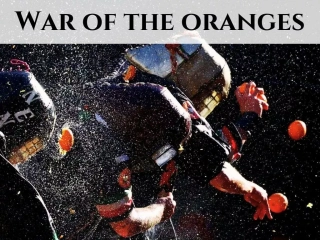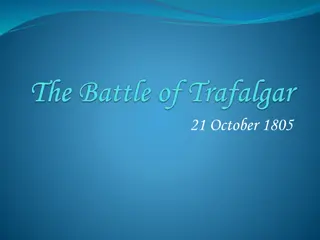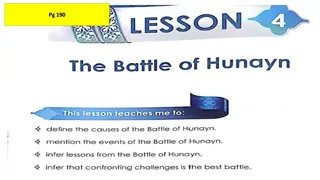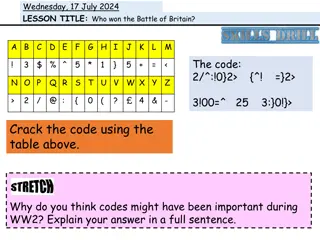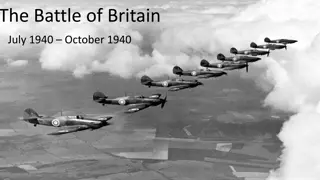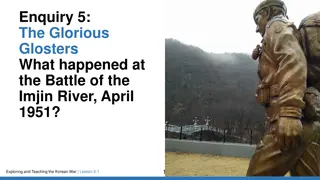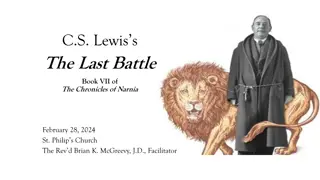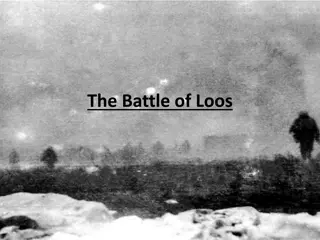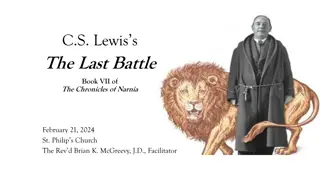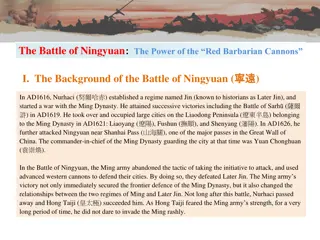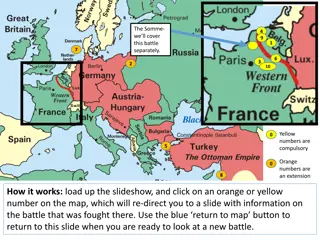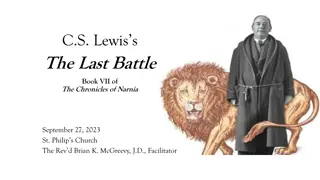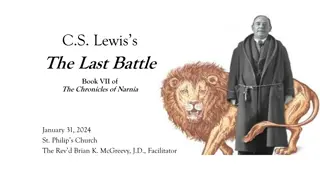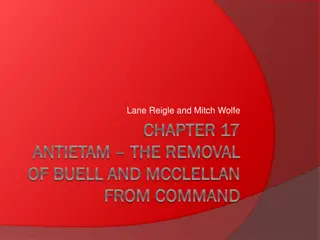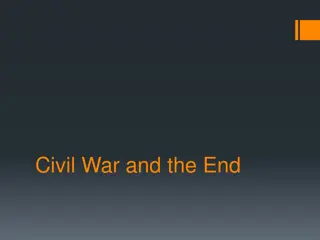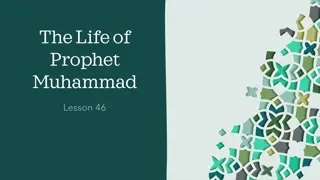The Last Battle - Chronicles of Narnia Reflections
Exploring the profound themes in C.S. Lewis' "The Last Battle" from The Chronicles of Narnia series, reflecting on freedom, sacrifice, love, and spiritual significance. Delve into the timeless messages and captivating storytelling that have made this book a classic.
Download Presentation

Please find below an Image/Link to download the presentation.
The content on the website is provided AS IS for your information and personal use only. It may not be sold, licensed, or shared on other websites without obtaining consent from the author.If you encounter any issues during the download, it is possible that the publisher has removed the file from their server.
You are allowed to download the files provided on this website for personal or commercial use, subject to the condition that they are used lawfully. All files are the property of their respective owners.
The content on the website is provided AS IS for your information and personal use only. It may not be sold, licensed, or shared on other websites without obtaining consent from the author.
E N D
Presentation Transcript
C.S. Lewiss The Last Battle Book VII of The Chronicles of Narnia September 20, 2023 St. Philip s Church The Rev d Brian K. McGreevy, J.D., Facilitator
It is for freedom that Christ has set us free. Stand firm, therefore, and do not submit again to a yoke of slavery. For you were called to freedom, brothers. Only do not use your freedom as an opportunity for the flesh, but through love serve one another. For the whole law is fulfilled in one word: You shall love your neighbor as yourself. --Galatians 3: 1, 13-14
How to approach this class: --On the beach --Snorkeling --Scuba diving --Email list How to read this book: --Try reading aloud and slowly, looking for layers of meaning --Fine to read ahead
The Last Battle Book VII in The Chronicles of Narnia Completed in 1953 but first published in 1956, with illustrations by Pauline Baynes Is it a marvelous capstone work that draws all the children s Narnia stories to a fitting close? Or is it a profound reflection on the sin of Eden, the means of Grace, and the Glory of Heaven? Or is it a parable about following Jesus that is particularly applicable to 21st century America and the importance of Word and Truth?
Review: Lewis and the Inklings and the Power of Story Finally, brothers, whatever is true, whatever is honorable, whatever is just, whatever is pure, whatever is lovely, whatever is commendable, if there is any excellence, if there is anything worthy of praise, think about these things. What you have learnedand received and heard and seen in me practice these things, and the God of peace will be with you. (Philippians 4:8-9) In a letter to his friend Sister Penelope in 1939, Lewis said Any amount of theology can now be smuggled into people s minds under cover of romance without their knowing it. The Chronicles of Narnia Written in a very brief period of time after World War II The Lion, the Witch and the Wardrobe (1950) Prince Caspian (1951) The Voyage of the Dawn Treader (1952) The Silver Chair (1953) The Horse and His Boy (1954) The Magician's Nephew (1955) The Last Battle (1956) -- The Last Battle was awarded the Carnegie Award, the highest award for children s literature --Enduring popularity--over 100 million copies sold in 47 languages --Waterstones survey best English children s story of all time is The Lion, the Witch, and the Wardrobe --In 2018, Netflix paid over $250 million for the rights to develop more Narnia films
Main Characters from earlier stories who appear in The Last Battle: Background of Aslan, Tirian, Eustace, Jill Aslan: from the Turkish word for lion, he is introduced in the first book as the Great Lion, the Son of the Emperor-beyond-the-Sea. He is the Great Lion, the Christ figure for Narnia, and he is the Creator of Narnia, who sings it into being in The Magician s Nephew. Aslan dies on the Stone Table in The Lion, the Witch, and the Wardrobe, but is resurrected by the Deep Magic. Tirian: Tirian is a young man in his 20s and the rightful King of Narnia, being the seventh king descended from King Rilian, who was the son of King Caspian X. He has never seen Aslan in the flesh but believes in him wholeheartedly, as well as in all the stories of the Old Narnia which he was told as a child. Eustace Scrubb: Eustace is a principal character in The Voyage of the Dawn Treader and is the odious schoolboy cousin of the Pevensie children. He is utterly transformed by Aslan, becoming one of the heroes of The Silver Chair. Jill Pole: We first meet Jill Pole in the opening scene of The Silver Chair. She is an unpopular middle school girl who is hiding away from bullies at school and crying behind the gym. She is transformed by Aslan and becomes one of the heroes of The Silver Chair.
Themes in The Last Battle The importance of Faith The nature of Evil The danger of Theological innovation The essentiality of Truth and the danger of deceit The power of language and the gift of speech Loyalty The danger of cynicism Worldly power and politics and the danger of corrupt leaders The Reality of Heaven and the JOY of eternal life Linkages with The Great Divorce and That Hideous Strength
Chapter 1: By Caldron Pool In the last days of Narnia, far up to the west beyond Lantern Waste and close beside the great waterfall, there lived an Ape. He was so old that no one could remember when he had first come to live in those parts, and he was the cleverest, ugliest, most wrinkled Ape you can imagine. He had a little house, built of wood and thatched with leaves, up in the fork of a great tree, and his name was Shift. There were very few Talking Beasts or Men or Dwarfs, or people of any sort, in that part of the wood, but Shift had one friend and neighbour who was a donkey called Puzzle. Setting: --the last days of Narnia --a Wood in the West beyond Lantern Waste near the great waterfall --few Talking Beasts or Men or Dwarfs --an Ape named Shift and a donkey named Puzzle
Apes and Monkeys --clever and mischievous --nearly human according to Darwinian theory Take my advice, when you meet anything that s going to be human and isn t yet, or used to be human once and isn t now, or ought to be human and isn t, you keep your eyes on it and feel for your hatchet. (Mr. Beaver in LWW) Even the idea of a monkey in a work of fiction provokes response. The uncanniness of the small humanoid face and little hands, combined with the distinctly non-human size and agility it s a moment when the reader is on notice that something non-quotidian is happening in these pages. Monkeys or apes in one form or another often appear as powerful agents of change in cherished classic fantasy novels. The sinister winged monkeys deployed by the Wicked Witch of the West are even scarier in the pages of Baum s first Oz book, The Wonderful Wizard of Oz (1900). The Last Battle (1956), the final volume of C.S. Lewis s Narnia Chronicles, features a despotic ape with the curious name Shift. (Paradigm shift? Perspective shift? Shiftless, shifty?) Shift dresses a donkey in a lion s skin, to create a counterfeit Aslan, which he uses to mislead the denizens of Narnia to the point of catastrophic destruction. Both Baum and Lewis depended on the uncanniness of these evil creatures to enact the worst kind of human impulses. In Flannery O Connor s marvelously weird A Good Man Is Hard to Find, there is a frisson of doomy strangeness earlier, when the traveling family arrives at Red Sammy s restaurant and there is a gray monkey about a foot high, chained to a chinaberry tree. When they go back to their car, there he is again, busy catching fleas on himself and biting each one carefully between his teeth as if it were a delicacy. He has a limited existence, and not much agency in this story. He s chained to a tree in a spot where he doesn t really belong at all. And that s it, done with the monkey. But his weird yet muted and unremarked-upon presence has been a herald of the strange possibilities that lie ahead. Prof Katharine Weber, Kenyon College, At Play in the Uncanny Valley
C.S. Lewis, Apes, and Mythopoeia Once Darwin started monkeying with the ancestry of Man, and Freud with his soul, and the economists with all that is his, man became the business of science. All that makes us truly human is gradually removed (purpose, freedom, imagination, speech, imago dei) leaving only trousered apes driven solely by instinct and feelings. (Cambridge lecture; The Abolition of Man ) Mythpoeia poem written by Tolkien for Lewis in 1931 about their conversation on Addison s Walk that led to Lewis s conversion. The dedication reads To one who said that myths were lies and therefore worthless, even though 'breathed through silver Philomythus to Misomythus Excerpt: I will not walk with your progressive apes, erect and sapient. Before them gapes the dark abyss to which their progress tends if by God's mercy progress ever ends
Donkeys No one in his senses can either revere or hate a donkey. It is a useful, sturdy, lazy, obstinate, patient, lovable and infuriating beast; deserving now the stick and now a carrot; both pathetically and absurdly beautiful There's no living with it till we recognize that one of its functions in our lives is to play the part of buffoon. Lewis in The Four Loves Lewis s poem The Ass Bottom s famous speech after being transformed from being a Donkey in Shakespeare s A Midsummer Night s Dream: The eye of man hath not heard, the ear of man hath not seen, man's hand is not able to taste, his tongue to conceive, nor his heart to report, what my dream was. I will get Peter Quince to write a ballad of this dream: it shall be called 'Bottom's Dream (4.1.209 213) This speech seems to be drawn from I Corinthians 2:9-10: "The things which eye hathe not sene, nether eare hath heard, nether came into man's heart, are, which God hathe prepared for them that love him. But God hathe reveiled them unto us by his Spirit: for the Spirit searcheth all things, yea, the deepe things of God. The donkey of the Nativity and the donkey of the Triumphal Entry Balaam s ass in Numbers 22
Balaam got up in the morning, saddled his donkey and went with the Moabite officials. But God was very angry when he went, and the angel of the LORD stood in the road to oppose him. Balaam was riding on his donkey, and his two servants were with him. When the donkey saw the angel of the LORD standing in the road with a drawn sword in his hand, it turned off the road into a field. Balaam beat it to get it back on the road. Then the angel of the LORD stood in a narrow path through the vineyards, with walls on both sides. When the donkey saw the angel of the LORD, it pressed close to the wall, crushing Balaam s foot against it. So he beat the donkey again. Then the angel of the LORD moved on ahead and stood in a narrow place where there was no room to turn, either to the right or to the left. When the donkey saw the angel of the LORD, it lay down under Balaam, and he was angry and beat it with his staff. Then the LORD opened the donkey s mouth, and it said to Balaam, What have I done to you to make you beat me these three times? Balaam answered the donkey, You have made a fool of me! If only I had a sword in my hand, I would kill you right now. The donkey said to Balaam, Am I not your own donkey, which you have always ridden, to this day? Have I been in the habit of doing this to you? No, he said. Then the LORD opened Balaam s eyes, and he saw the angel of the LORD standing in the road with his sword drawn. So he bowed low and fell facedown. The angel of the LORD asked him, Why have you beaten your donkey these three times? I have come here to oppose you because your path is a reckless one before me.The donkey saw me and turned away from me these three times. If it had not turned away, I would certainly have killed you by now, but I would have spared it. Numbers 22:21-33
Lewis and Names: No Accidents Shift Shift a slight change in position, direction, or tendency c. 1200, "to alter, make different, change" (transitive); early 13c. as "to substitute one for another;" mid-13c. as "to make (something) other than what it was, cause to turn or pass from one state to another" (from Etymology Online) Shifty intelligent and skilled in deceiving others shifty (adj.) 1560s, "well able to manage for oneself, fertile in expedients," from shift "dodge, trick, artifice" Puzzle nounsomething that is difficult to understand or explain, a mystery verb to cause someone to feel confused and slightly worried because they cannot understand something Medieval French, bewilder, confound, perplex
The Most Clever and the Most Crafty: Watch for Parallels with Genesis 3 [Shift] was so old that no one could remember when he had first come to live in those parts, and he was the cleverest, ugliest, most wrinkled Ape you can imagine. He had a little house, built of wood and thatched with leaves, up in the fork of a great tree, and his name was Shift. There were very few Talking Beasts or Men or Dwarfs, or people of any sort, in that part of the wood. The Last Battle, Chapter 1 Now the serpent was more crafty than any of the wild animals the LORD God had made. He said to the woman, Did God really say, You must not eat from any tree in the garden ? The woman said to the serpent, We may eat fruit from the trees in the garden, but God did say, You must not eat fruit from the tree that is in the middle of the garden, and you must not touch it, or you will die. You will not certainly die, the serpent said to the woman. For God knows that when you eat from it your eyes will be opened, and you will be like God, knowing good and evil. Genesis 3
Key Passages and Themes in Chapter One Bullying and Consequences At least they both said they were friends, but from the way things went on you might have thought Puzzle was more like Shift's servant than his friend. He did all the work. When they went together to the river, Shift filled the big skin bottles with water but it was Puzzle who carried them back. When they wanted anything from the towns further down the river, it was Puzzle who went down with empty panniers on his back and came back with the panniers full and heavy. And all the nicest things that Puzzle brought back were eaten by Shift; for as Shift said, "You see Puzzle, I can't eat grass and thistles like you, so it's only fair I should make it up in other ways." And Puzzle always said, "Of course, Shift, of course. I see that." Puzzle never complained, because he knew that Shift was far cleverer than himself and he thought it was very kind of Shift to be friends with him at all. And if ever Puzzle did try to argue about anything, Shift would always say, "Now, Puzzle, I understand what needs to be done better than you. You know you're not clever, Puzzle." And Puzzle always said, "No, Shift. It's quite true. I'm not clever." Then he would sigh and do whatever Shift had said. Do nothing from selfish ambition or conceit, but in humility count others more significant than yourselves. Philippians 2:3Whoever walks in integrity walks securely, but he who makes his ways crooked will be found out. Proverbs 10:9Be careful, however, that the exercise of your freedom does not become a stumbling block to the weak. For if anyone with a weak conscience sees you who have this knowledge eating in an idol's temple, won't he be emboldened to eat what has been sacrificed to idols? So this weak brother, for whom Christ died, is destroyed by your knowledge. When you sin against your brothers in this way and wound their weak conscience, you sin against Christ. Therefore, if what I eat causes my brother to fall into sin, I will never eat meat again, so that I will not cause him to fall. I Cor. 8:10-14
Manipulation and Temptation "Look! What's that?" "What's what?" said Puzzle. "That yellow thing that's just come down the waterfall. Look! There it is again, it's floating. We must find out what it is." "Must we?" said Puzzle. "Of course we must," said Shift. "It may be something useful. Just hop into the Pool like a good fellow and fish it out. Then we can have a proper look at it." "Hop into the Pool?" said Puzzle, twitching his long ears. "Well how are we to get it if you don't?" said the Ape. "But but," said Puzzle, "wouldn't it be better if you went in? Because, you see it's you who want to know what it is, and I don't much. And you've got hands, you see. You're as good as a Man or a Dwarf when it comes to catching hold of things. I've only got hoofs. But at last, when he was almost tired to death, and bruised all over and numb with cold, he succeeded in gripping the thing with his teeth. And out he came carrying it in front of him and getting his front hoofs tangled up in it, for it was as big as a large hearthrug, and it was very heavy and cold and slimy. He flung it down in front of Shift and stood dripping and shivering and trying to get his breath back. But the Ape never looked at him or asked him how he felt. The Ape was too busy going round and round the Thing and spreading it out and patting it and smelling it. Then a wicked gleam came into his eye and he said "It is a lion's skin. Do not take advantage of each other but fear your God. I am the LORD your God. Lev. 25:17 Beware of false prophets who come disguised as harmless sheep but are really vicious wolves. Mt. 7:15 Each person is tempted when they are dragged away by their own evil desire and enticed. Then, after desire has conceived, it gives birth to sin; and sin, when it is full-grown, gives birth to death. Jas. 1:14-15 There are six things the LORD hates, seven that are detestable to him: haughty eyes, a lying tongue, hands that shed innocent blood, a heart that devises wicked schemes, feet that are quick to rush into evil, a false witness who pours out lies and a man who stirs up dissension among brothers. Prov. 6:16-19
Truth, Sins of Omission, Holiness, and Doing Whats Right "I wonder who killed the poor lion," said Puzzle presently. "It ought to be buried. We must have a funeral." "Oh, it wasn't a Talking Lion," said Shift. "You needn't bother about that. There are no Talking Beasts up beyond the Falls, up in the Western Wild. This skin must have belonged to a dumb, wild lion." This, by the way, was true. A Hunter, a Man, had killed and skinned this lion somewhere up in the Western Wild several months before. But that doesn't come into this story. "All the same, Shift," said Puzzle, "even if the skin only belonged to a dumb, wild lion, oughtn't we to give it a decent burial? I mean, aren't all lions rather well, rather solemn. Because of you know Who. Don't you see?" "Don't you start getting ideas into your head, Puzzle," said Shift. "Because, you know, thinking isn't your strong point. We'll make this skin into a fine warm winter coat for you." "Oh, I don't think I'd like that," said the Donkey. "It would look I mean, the other Beasts might think that is to say, I shouldn't feel " "What are you talking about?" said Shift, scratching himself the wrong way up as Apes do. "I don't think it would be respectful to the Great Lion, to Aslan himself, if an ass like me went about dressed up in a lionskin," said Puzzle. Lying lips are an abomination to the LORD, but those who act faithfully are his delight. Proverbs12:22 Therefore, having put away falsehood, let each one of you speak the truth with his neighbor, for we are members one of another. Eph 4:25 So any person who knows what is right to do but does not do it, to him it is sin. James 4:17 Do not repay anyone evil for evil. Be careful to do what is right in the eyes of everybody. Romans 12:17 Therefore let us be grateful for receiving a kingdom that cannot be shaken, and thus let us offer to God acceptable worship, with reverence and awe, for our God is a consuming fire. Hebrews 12:28
Secret Sin As soon as he was alone Shift went shambling along, sometimes on two paws and sometimes on four, till he reached his own tree. Then he swung himself up from branch to branch, chattering and grinning all the time, and went into his little house. He found needle and thread and a big pair of scissors there; for he was a clever Ape and the Dwarfs had taught him how to sew. He put the ball of thread (it was very thick stuff, more like cord than thread) into his mouth so that his cheek bulged out as if he were sucking a big bit of toffee. He held the needle between his lips and took the scissors in his left paw. Then he came down the tree and shambled across to the lionskin. He squatted down and got to work. He saw at once that the body of the lionskin would be too long for Puzzle and its neck too short. So he cut a good piece out of the body and used it to make a long collar for Puzzle's long neck. Then he cut off the head and sewed the collar in between the head and the shoulders. He put threads on both sides of the skin so that it would tie up under Puzzle's chest and stomach. Every now and then a bird would pass overhead and Shift would stop his work, looking up anxiously. He did not want anyone to see what he was doing. But none of the birds he saw were Talking Birds, so it didn't matter. The eye is the lamp of the body. If your eyes are good, your whole body will be full of light. But if your eyes are bad, your whole body will be full of darkness. If then the light within you is darkness, how great is that darkness! Mt. 6:22-23 What you have said in the dark will be heard in the daylight. What you have whispered to someone behind closed doors will be shouted from the rooftops Luke 12:3
Passive Aggression and Manipulation, Deception, and Pride Come and try on your beautiful new lionskin coat," said Shift. "Oh bother that old skin," said Puzzle, "I'll try it on in the morning. I'm too tired tonight." "You are unkind, Puzzle," said Shift. "If you're tired, what do you think I am? All day long, while you've been having a lovely refreshing walk down the valley, I've been working hard to make you a coat. My paws are so tired I can hardly hold these scissors. And now you won't say thank-you and you won't even look at the coat and you don't care and and " "My dear Shift," said Puzzle getting up at once, "I am so sorry. I've been horrid. Of course I'd love to try it on. And it looks simply splendid. Do try it on me at once. Please do." "Well, stand still then," said the Ape. The skin was very heavy for him to lift, but in the end, with a lot of pulling and pushing and puffing and blowing, he got it onto the donkey. He tied it underneath Puzzle's body and he tied the legs to Puzzle's legs and the tail to Puzzle's tail. A good deal of Puzzle's grey nose and face could be seen through the open mouth of the lion's head. No one who had ever seen a real lion would have been taken in for a moment. But if someone who had never seen a lion looked at Puzzle in his lionskin, he just might mistake him for a lion, if he didn't come too close, and if the light was not too good, and if Puzzle didn't let out a bray and didn't make any noise with his hoofs. "You look wonderful, wonderful," said the Ape. "If anyone saw you now, they'd think you were Aslan, the Great Lion, himself." "That would be dreadful," said Puzzle. "No it wouldn't," said Shift. "Everyone would do whatever you told them." "But I don't want to tell them anything."
"But think of the good we could do!" said Shift. "You'd have me to advise you, you know. I'd think of sensible orders for you to give. And everyone would have to obey us, even the King himself. We would set everything right in Narnia." "But isn't everything right already?" said Puzzle. "What!" cried Shift. "Everything right? when there are no oranges or bananas?" "Well, you know," said Puzzle, "there aren't many people in fact, I don't think there's anyone but yourself who wants those sort of things." "There's sugar too," said Shift. "H'm, yes," said the Ass. "It would be nice if there was more sugar. But each one is tempted when he is drawn away by his own desires and enticed. Then, when desire has conceived, it gives birth to sin; and sin, when it is full-grown, brings forth death James 1:14-16 I am the LORD your God, who brought you out of the land of Egypt, out of the house of slavery. You shall have no other gods before Me. You shall not make for yourself an idol in the form of anything in the heavens above, on the earth below, or in the waters beneath. Exodus 20:2-4 Do nothing out of selfish ambition or vain conceit, but in humility consider others better than yourselves. Each of you should look not only to your own interests, but also to the interests of others. Philippians 2:14
The Danger of False Prophets and Failing to Stand Up for the Truth "Well then, that's settled," said the Ape. "You will pretend to be Aslan, and I'll tell you what to say." "No, no, no," said Puzzle. "Don't say such dreadful things. It would be wrong, Shift. I may be not very clever but I know that much. What would become of us if the real Aslan turned up?" "I expect he'd be very pleased," said Shift. "Probably he sent us the lionskin on purpose, so that we could set things to right. Anyway, he never does turn up, you know. Not now-a-days." At that moment there came a great thunderclap right overhead and the ground trembled with a small earthquake. Both the animals lost their balance and were flung on their faces. "There!" gasped Puzzle, as soon as he had breath to speak. "It's a sign, a warning. I knew we were doing something dreadfully wicked. Take this wretched skin off me at once." "No, no," said the Ape (whose mind worked very quickly). "It's a sign the other way. I was just going to say that if the real Aslan, as you call him, meant us to go on with this, he would send us a thunderclap and an earth-tremor. It was just on the tip of my tongue, only the sign itself came before I could get the words out. You've got to do it now, Puzzle. And please don't let us have any more arguing. You know you don't understand these things. What could a donkey know about signs? But a prophet who presumes to speak in my name anything I have not commanded, or a prophet who speaks in the name of other gods, is to be put to death. Deut. 18:20 Then the LORD said to me, The prophets are prophesying lies in my name. I have not sent them or appointed them or spoken to them. They are prophesying to you false visions, divinations, idolatries and the delusions of their own minds. Jeremiah 14:14 For false messiahs and false prophets will appear and perform great signs and wonders to deceive, if possible, even the elect. Mt. 24:24 Dear friends, do not believe every spirit, but test the spirits to see whether they are from God, because many false prophets have gone out into the world. I John 4:1
A taste of what we have to look forward to: It is as hard to explain how this sunlit land was different from the old Narnia as it would be to tell you how the fruits of that country taste. Perhaps you will get some idea of it if you think like this. You may have been in a room in which there was a window that looked out on a lovely bay of the sea or a green valley that wound away among mountains. And in the wall of that room opposite to the window there may have been a looking-glass. And as you turned away from the window you suddenly caught sight of that sea or that valley, all over again, in the looking glass. And the sea in the mirror, or the valley in the mirror, were in one sense just the same as the real ones: yet at the same time there were somehow different deeper, more wonderful, more like places in a story: in a story you have never heard but very much want to know. The difference between the old Narnia and the new Narnia was like that. The new one was a deeper country: every rock and flower and blade of grass looked as if it meant more. I can t describe it any better than that: if ever you get there you will know what I mean. It was the Unicorn who summed up what everyone was feeling. He stamped his right fore-hoof on the ground and neighed, and then he cried: I have come home at last! This is my real country! I belong here. This is the land I have been looking for all my life, though I never knew it till now. The reason why we loved the old Narnia is that is sometimes looked a little like this. Bree-hee-hee! Come further up, come further in! C.S. Lewis, The Last Battle Chapter 15
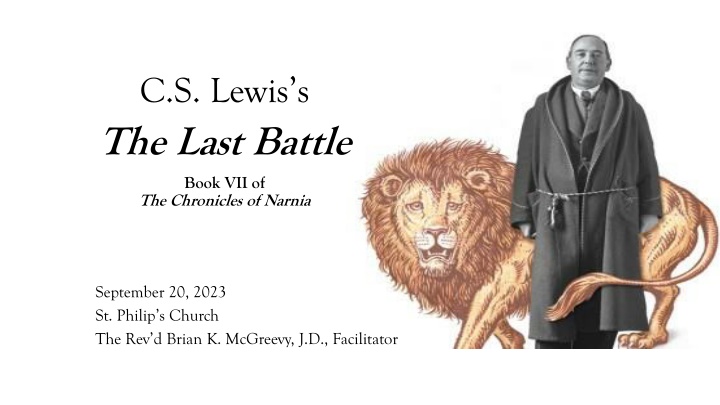

![READ⚡[PDF]✔ European Mail Armour: Ringed Battle Shirts from the Iron Age, Roman](/thumb/20552/read-pdf-european-mail-armour-ringed-battle-shirts-from-the-iron-age-roman.jpg)

